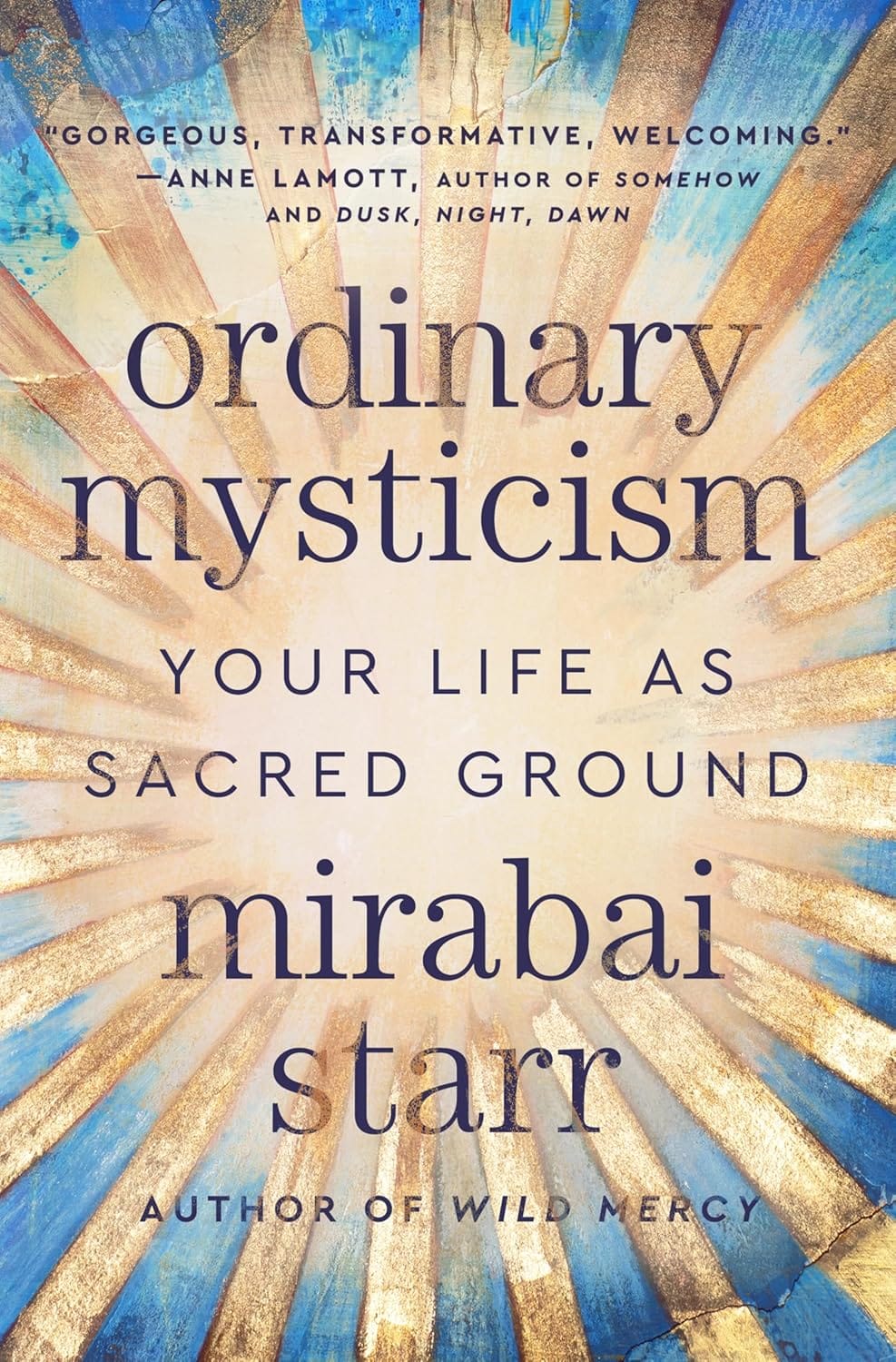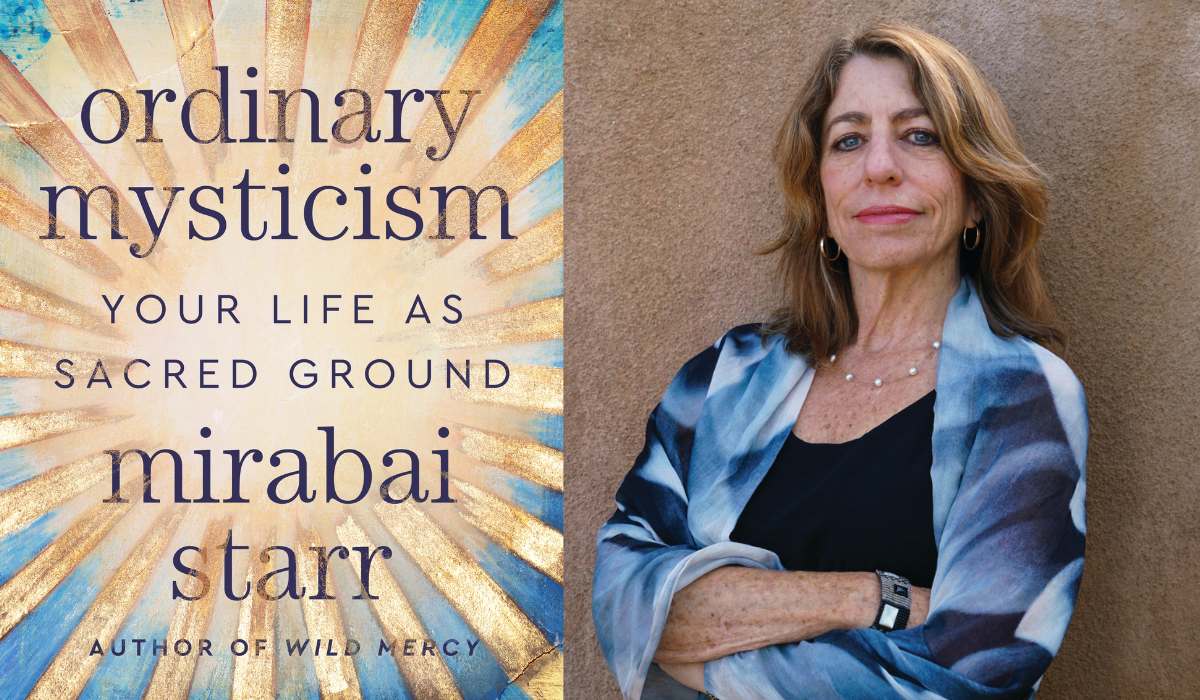You Don’t Need Religion to Find Spirituality. Mirabai Starr Shows Us How to Make Even the Mundane Mystical
All her life, Mirabai Starr wanted to be one of the “God-intoxicated ones” as she calls them—the kind of spiritual person who exudes stillness and embodies equanimity. The type of person who might chant all night in a temple or know the Beatitudes by heart.
And then, she didn’t want that. Instead, she wanted to walk the path of what she calls the ordinary mystic—someone who’s able to be present with what is, whatever that may be.
Starr wants that for all of us, too.
“I want you to be exactly who you are: a true human person doing their best to show up for this fleeting life with a measure of grace, with kindness and a sense of humor, with curiosity and a willingness to not have all the answers, with reverence for life,” she writes in her new book, Ordinary Mysticism: Your Life as Sacred Ground. “Say yes to what is, even when it is uncomfortable or embarrassing or heartbreaking. Hurl your handful of yes into the treetops and then lift your face as the rain of yes drops its grace all over you, all around you, and settles deep inside you.”
The Sunday Paper caught up with Starr after her book reading in Boulder, Colorado, this week to ask her how we might get better at saying yes to what is, find more love and grace in the everyday, and walk the path of the ordinary mystic.
A CONVERSATION WITH MIRABAI STARR
In your book, you write about your friend Father Greg Boyle—Father G—who “endures huge suffering by disarming his heart, again and again.” Now feels like a time for all of us to disarm our hearts. How do we do that?
Often when we’re faced with people who disagree with us, the first impulse is to arm ourselves. If we feel attacked or threatened in any way, it’s intuitive to protect yourself—and often protecting yourself means making the other person wrong and bad. It seems counterintuitive to take off the protection and be vulnerable and curious. However, it’s only counterintuitive to a certain consciousness—what I might call a patriarchal paradigm, where it’s offense and defense and zero-sum game. A more feminine approach welcomes not knowing, welcomes the mystery, and is much more interested in building community than improving an argument.
When I say feminine, I’m not speaking about gender. I’m speaking about a spirit, a mode of soul that belongs to all of us, to people of all genders, that has to do with compassion and caring, and also a kind of wildness—an embodied, even fierce willingness to tell the truth and to do justice by people who may not be able to fight for justice themselves.
When I’m talking about the feminine, I’m talking about a kind of spiritual orientation that’s comfortable with paradox. You can be fierce and tender. You can be ordinary and mystical. You can be compassionate and discerning.
There’s a stunning line in your book where you write about the “fragrance of the sacred” which can be found “within the fiery heart of the human predicament.” Where do you find the fragrance of the sacred?
Well again, this is the paradox of not just the feminine, but the mystical path. I have experiences of rapture and ecstasy on a daily basis, often nestled inside very ordinary moments, like the first cup of coffee in the morning or the smile of a child—a grandchild in my case. But I’ve also experienced it in great sorrow and great loss and deep suffering.
I’ve experienced a lot of death in my life. And death has peeled back the veil for me, more than almost anything—the veil meaning the complacency, drudgery, habitual patterns of thinking, and humdrum realities of everyday life. It feels like a veil is removed when I’m in the presence of death and I glimpse something more vast and real. I don’t love losing people. In fact, I hate it. But I will attest to the fragrance of the sacred that wafts from the fire of a broken heart.
You say that being held in a loving gaze can feel scary. How do we hold others in a loving gaze, and how can we get more comfortable being held in that gaze?
We can’t impose our loving gaze on each other. You know how annoying it is when someone is trying to be spiritual with you? Like, they’re gazing into your eyes and trying to radiate compassion? What I’m talking about is more nuanced and can be very subtle. It’s authentic, and nobody else has to notice that you’re gazing through the eyes of love. It’s an orientation of the heart, and it changes everything. It changes the gazer.
As far as being held, that’s a beautiful question. How do we soften enough to risk being seen? And to be seen with unconditional love?
And why can that feel so hard?
Because you have all of it—and because they’re seeing all of it and loving you in the fullness of who you are, which includes all the parts that you don’t want to be seen.
To be fully seen means that your shadow is being seen too, and your shadow is being loved, too. And that whole paradigm of perfection and purification and sanctity precludes the shadow. Too often we feel we have to be worthy of being unconditionally loved, meaning you have no so-called imperfections. But it’s the imperfections, in a way, that are the most beautiful. It’s all of the darkness and shame and beauty and poetry of your soul that nobody else sees.
At your book reading, you talked about the importance of making others feel cherished. How do you do this?
It starts with intention. I am going to walk the path of the mystic, which means I’m going to be on the lookout for love, and I’m going to encounter it, and I’m going to be it, and I’m going to radiate it, and I’m going to share it. So, intention is the beginning—one that happens again and again and again. That is the path of love—of the ordinary, mystical life.
And the more we intend it, the more naturally it flows. It’s so easy to see what’s beautiful about someone when you look.
It takes practice to keep the heart disarmed. To stay curious about others and to choose love first. This is a much more enlivening way to live.
What can we do in moments when we’ve missed the mark—when we didn’t choose love first or disarm our hearts? How do we stay gentle with ourselves, and then try to do better?
This whole self-improvement project is so individualistic. We’ve been conditioned by all the religions and also by psychology to work on ourselves and purify and perfect ourselves. It is endless. And it can be so discouraging, because we keep waking up and making the same mistakes over and over again.
The individual path is really lonely and daunting. But when we do it in community, it’s less overwhelming. So, I recommend cultivating soul friendships with people who see you in your shadow and your light—people who can love you through it and tell you the truth, but mostly be gentle with you and supportive.
In the epilogue of your book, there’s a beautiful section called “Rain of Yes” that’s about walking the path of the ordinary mystic by saying “yes” to what is. Can you share more about this passage?
When I’m speaking about the path of the ordinary mystic, I am speaking very much about being present with what is, whatever that may be—not turning from it or trying to explain it or couch it in some kind of theological language. It’s a kind of naked experience of reality.
When I say yes to what is, it feels like a space opens up around whatever the experience is that’s vast enough to contain it, whether it’s difficult or glorious or absolutely mundane—but the mundane as a portal to the sublime.
The yes has this magical quality of peeling back the protective layers that we can’t help but put between ourselves and the heart of the universe, which is love.
I had this image as I was writing that last section of the book—and I remember it because I cried when I wrote it, which is always a sign that you’re tapping into something. It was this image of when we say yes, it comes back to us as a rain of grace. And so, whether it’s the death of a child or a walk in the woods, the intention to walk the way of love yields an abundance of blessings.

Mirabai Starr is an award-winning author, internationally acclaimed speaker, and a leading teacher of interspiritual dialogue. In 2020, she was honored on Watkins' list of the 100 Most Spiritually Influential Living People. Drawing from 20 years of teaching Philosophy and World Religions at the University of New Mexico-Taos, Mirabai now travels the world sharing her wisdom on contemplative living, writing as a spiritual practice, and the transformational power of grief and loss.
Please note that we may receive affiliate commissions from the sales of linked products.



